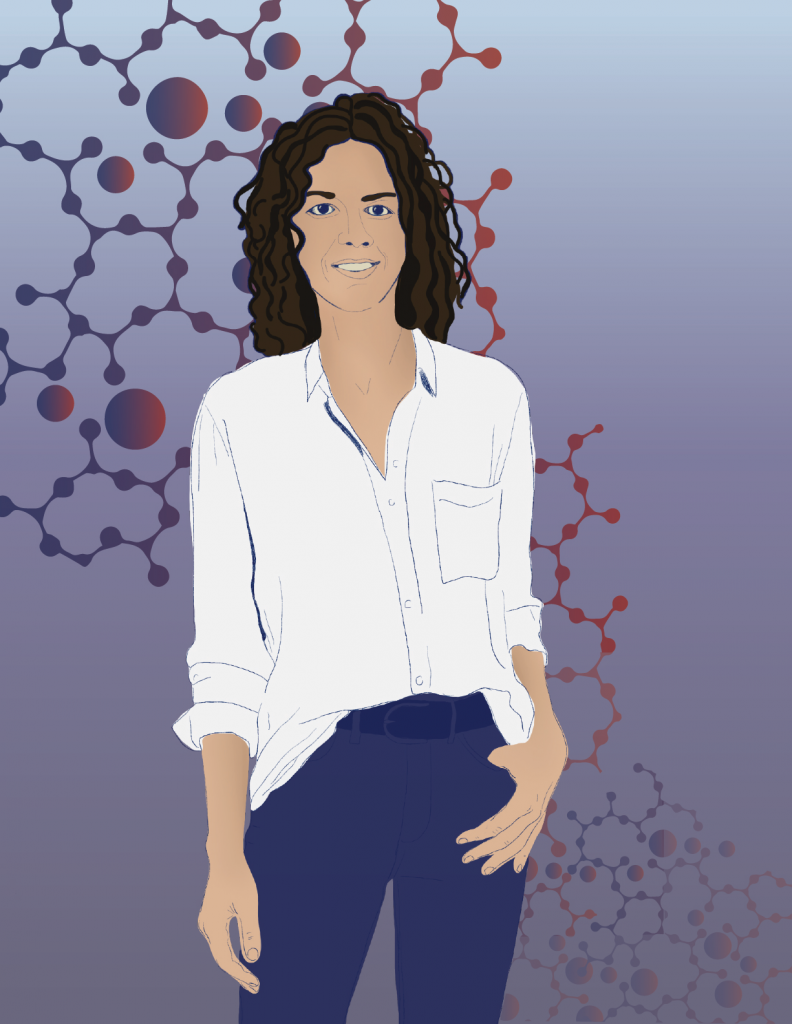
Celia Reina, William K. Gemmill Term Assistant Professor in Mechanical Engineering and Applied Mechanics, recently received the National Science Foundation’s CAREER Award for interdisciplinary research spanning mechanical engineering, statistical physics and machine learning. The Award will fund Reina’s research and multiple associated outreach initiatives designed to increase gender, racial and socioeconomic diversity in STEM.
Reina’s research focuses on understanding the mechanical response of materials when subjected to external forces. These responses stem from the material’s underlying microstructure, or the specific arrangement of atoms or particles within it. By understanding this link, materials can be designed faster and made stronger, boosting their reliability for use in many engineering applications.
“We are working on the fundamentals; how to understand, quantify and predict how complex materials deform through a microscopic understanding of material response,” says Reina.
In our everyday lives, materials undergo different, complex deformation processes, whether it’s toothpaste being squeezed out of its tube, a cookie crumbling as we chew, or sand being pulled through an hourglass. Understanding how certain materials react to a specific kind of deformation, such as the impact of a rock hitting a car windshield, is therefore critical in improving their design and expanding their range of applications. However, the complex particle rearrangements during these large deformations make it inherently challenging to predict how the material will behave under stress.
Reina’s work aims to advance our understanding and predictive capability of some of these behaviors.
“For example, when you bend a paper clip it stays in its new shape, which means there was particle rearrangement within the structure,” Reina says. “If we could use the microscopic particle structure and dynamics to better predict how the material will react to external forces on a large scale, we could design those materials faster, at lower costs, and with more reliability.”
Reina’s CAREER Award will involve the use of machine learning to better understand how the microstructure of a material affects its effective mechanical response.
“Machine learning is a useful tool for understanding complex systems where physical intuition may fail us,” says Reina. “Once you move from a well-understood and highly predictable material description at the atomic or particle scale, to a continuum description, the models become simplified, which introduces assumptions and uncertainty in their prediction. Machine learning can guide us in our modeling assumptions to retain, to the extent possible, the high predictability from the atomic description, as we scale up to the continuum level. I am excited to be collaborating with internal and external experts in machine learning as well as a new graduate student to learn more about this tool and its applications in my research.”
Reina embraces interdisciplinary approaches to answer the research questions that drive her scientific career. For her CAREER Award project, she will be partnering with other Penn Engineering researchers to validate the predictions of her computational simulations with experiments on real materials. Specifically, she will be using colloids, which are particles suspended in a medium.
“The benefit of using colloids when studying material response is the ability to observe each particle dispersed in the medium individually and follow its motion, which would be impossible at the atomic scale,” says Reina. “Additionally, Penn is home to a large community of researchers already using colloids and other disordered systems, which will provide an invaluable resource for the proposed investigation.”
Having experimental systems that can be directly observed and manipulated can benefit researchers, but is essential for students just beginning to learn about the fundamentals of science. Reina plans to share the CAREER Award-funded research with the public and underrepresented STEM students through interactive presentations.
“Of the many outreach projects planned, one is an interactive science experiment through the Franklin Institute, where we plan to engage the public with the idea of irreversible versus reversible deformations of materials. For example, an egg cracking or ice cream melting are examples of processes that cannot be easily reversed, while bouncing a tennis ball is a good example of deformation that can.”
Outreach and mentorship are important to Reina as she recognizes the mentors in her life that have been essential to her pursuit of a STEM research career. She hopes to inspire underrepresented students to continually diversify the field. To this aim, Reina plans to share her research at the Women in Computer Science (WICS) high school day for girls, as well as to engage with Penn’s collaboration with the University of Puerto Rico (UPR).
“I wanted my outreach events to increase gender and racial equity in STEM, and I have a personal desire to connect with students who are underrepresented,” says Reina. “I would like to establish a Research Experience for Undergraduates program for a student at UPR to join my lab on Penn’s campus, and I hope that being from Spain and speaking Spanish will make that supervisor-student connection more personal.”
“I am working on some of the fundamentals of mechanical engineering research that down the line will have much larger applications, and I think it is important for the public to engage with this science. Fortunately, I will be receiving science communication training through the Franklin Institute so that these outreach activities can make a bigger impact.”
